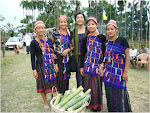BACKGROUND AND OBJECTIVES: Mathematics Education Trust, Assam (
META) came into existence in June, 2004 at the initiative of a group of likeminded people engaged in promotion of mathematics education in the North-east region of the country. These individuals have been involved in various activities like Mathematics Training and Talent Search (MT&TS) Programme of NBHM, Mathematics Olympiad and other voluntary training programmes in this region for the last several years. The experience of these activities suggests that there is a conspicuous gap between the students of this region and the rest of the country in terms of the level of quality and maturity. Therefore, it is felt that unless some special attention is given externally and from a much lower level, there is hardly any hope for improvement of mathematics education in this region only through formal education.
As a result, the trust was formally formed with the following objectives:
1. To organize workshops, seminars and such other activities for improving the awareness and standard of mathematics education in this region.
2. To encourage young and committed school and college teachers to act as disseminators of the cause of quality mathematics education.
3. To develop educational aids and techniques relevant to the specific scenario prevalent in this region.
4. To support promising and needy students of mathematics by providing them financial assistance to pursue their studies.
5. To support and provide financial aid and expertise to other centres or institutions to take up activities and programmes in accordance with the stated objectives.
ORGANIZATION:
The core of the Trust is the Board of Trustees, currently having the following members as trustees:
Prof. Tarakeswar Choudhary, Presently Visiting Professor, Tezpur University, Tezpur, Assam.
Prof. Nanda Ram Das, Department of Mathematics, Gauhati University, Guwahati.
Dr. Meenaxi Barkataki-Ruscheweyh (formerly Bhattacharjee), Department of Mathematics, University of Wuerzburg, Germany.
Dr. Swaroop Nandan Bora, Department of Mathematics, IIT Guwahati, Guwahati.
Dr. Bhaba Kumar Sarma (Managing Trustee), Department of Mathematics, IIT Guwahati, Guwahati.
To plan and carry out its various activities, the Trust has a Programme Committee comprising of fifteen members nominated by the Board of Trustees drawn from different parts of this region (presently all are from the state of Assam). The members of this committee are dedicated teachers who are involved in various voluntary activities for promotion of mathematics and science education in this region. These are some of the people who feel concerned at the present scenario of mathematics education and are ready to work towards its improvement.
For more details and information kindly contact any of the trustees.
Read more...









